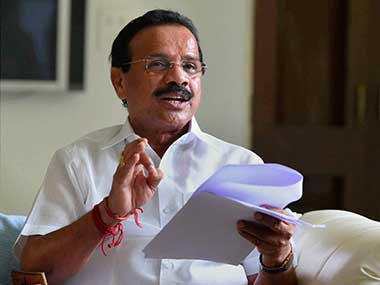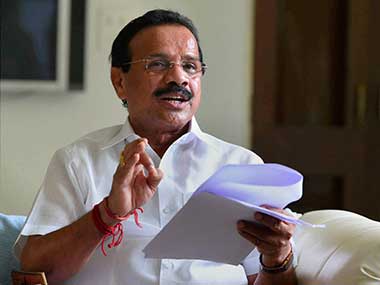More than Narendra Modi’s backing, Railway Minister Sadananda Gowda should take Rahul Gandhi’s vapid criticism of his rail budget as the biggest vote of confidence. For a man in whose political interests the entire national economy was derailed by the UPA, the Gandhi scion’s criticism of Gowda’s budget as lacking in vision and not being “pro-poor” tells us that the budget is on the right track. [caption id=“attachment_1610353” align=“alignleft” width=“380”]  Union Railway Minister Sadananda Gowda. PTI[/caption] If being “pro-poor” means announcing 99 projects and not completing 98 of them in 10 years, it seems more like political fraud. Gowda and India are better off without such “pro-poor” policies. If railway money is spent on upgrading track, investing in safety and finishing projects that are worth finishing instead of announcing 100 more new projects that won’t get implemented, it is actually pro-poor. It is the poor and the non-rich who use the railways the most and it is they who die in avoidable railway accidents. For them a project finished is of some use, not a project with a foundation stone that gathers moss in the monsoon rain. However, this is not to say Gowda’s budget deserves a triple A rating. I would give it a single A for beginning to stem the rot and telling us the truth about railway mismanagement. I would hold back another A till the end of the financial year when we can take stock of how much he has delivered on his promise and how much was just hot air. We can award the third A at the end of the Modi government’s five-year term, assuming it has done its job and shown results. We can’t judge a railway minister with one budget speech when the mandate is for five years. For several years now I have been a bitter critic of railway budget speeches , and also Union budget speeches for that matter. Simple reason: they have become big media events that de-focus ministers from doing what they need to do. The hype and hoopla surrounding budget events now makes budget speeches more about showmanship than substance. (Read Gowda’s railway budget speech here.) So let me say it again: Gowda’s job begins the day after the budget, which is today (9 July), and Arun Jaitley’s job begins the day after - after he delivers his maiden Union budget speech tomorrow (10 July). The real job of the railway minister is to lay down the direction on Day One and see that policies are implemented in the other 364 days of the year. Ditto for the finance minister. Budgets have become public tamashas because we have been taught to believe that it is the day to look out for giveaways (or tax blows) when the fact is budgets are not about raising resources or giving them away, but about ensuring bang for the buck. The real jobs of ministers is to monitor spending so that the taxpayer’s contributions are not frittered away. It is not about increasing revenues, but about how well money is spent. Any fool can throw money that’s not his to buy himself an extra voter, but it takes hard work to make sure that your money and mine is not wasted in re-electing mindless populists like Rahul Gandhi and others of his ilk. So Gowda should be congratulated for largely eschewing populism and presenting a stem-the-rot rail budget. But his test begins now: the work to be done in the remaining 230-and-odd days before the next rail budget includes completing projects left unfinished by the UPA so that they start generating revenues, strengthening and upgrading tracks so that they stand the strain of higher usage, and - most important - creating the policy structures necessary to bring in FDI and domestic private investment to the railways. Without the last, there will be no bullet trains of high-speed rail corridors. Between now and February-end 2015, Gowda has to create the policy framework that will allow India to build a modern railway system. The single line of hope in his speech that pointed towards this and possible corporatisation of the railways was this: “At the moment, the Railway Board, due to overlapping roles of policy formulation and implementation, has become unwieldy. Therefore, I propose to separate these two functions.” This is a sound idea. The task of the railway minister and the board is not to run a commercial organisation – that is the job of zonal managers, who are like CEOs – but set policy and oversee its implementation. Why only the railways, the same should be done with all public sector undertakings – Air India should not come under the aviation ministry, SAIL should not come under the steel ministry, and Coal India under the coal ministry – and so on. The ministry’s job is policy formulation for an industry – and not the public sector alone. Gowda is making the right choice in seeking to separate the Railway Board’s policy-making function. This is a big move. But he will have to watch his back. His biggest task is to talk to the unions and buy their compliance. Among all unions in the country, the railway unions are the only ones who can cause substantial economic damage by strikes and blockage of services. They need to be brought on board so that their inherent capacity to hold the country to ransom is neutralised by greater private participation in the railways. The railways are one monopoly we can’t afford.
Sadananda Gowda presented a stem-the-rot budget, so Rahul’s criticism that it is not pro-poor can be ignored. But Gowda’s real work begins now. The speech will be forgotten, but he has to implement the Modi vision flawlessly.
Advertisement
End of Article
Written by R Jagannathan
R Jagannathan is the Editor-in-Chief of Firstpost. see more


)

)
)
)
)
)
)
)
)



